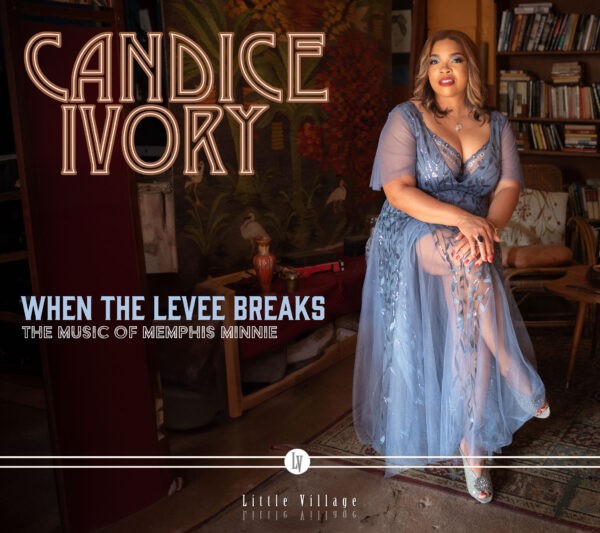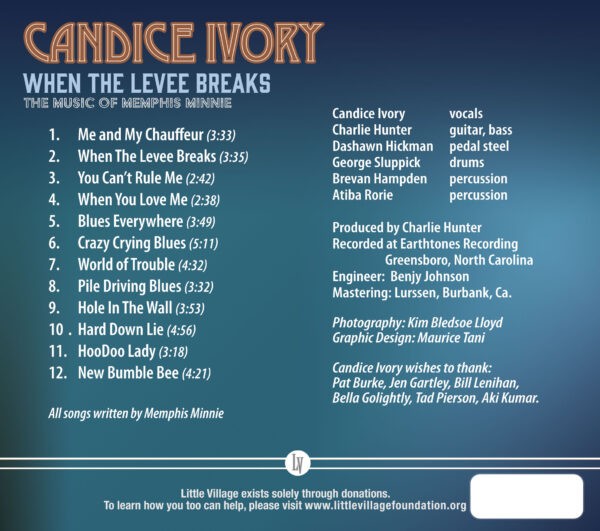Candice Ivory – When The Levee Breaks – The Music Of Memphis Minnie

Candice Ivory – When The Levee Breaks – The Music Of Memphis Minnie
Format: CD
Label: Little Village
Release: 2023
Release date: October 6, 2023
After releasing three critically-acclaimed albums of original, jazz-fueled songs, Candice Ivory reveals a whole new sound with her blues matriarch tribute, ‘When the Levee Breaks: The Music of Memphis Minnie.’
The Memphis-raised and St. Louis-based Queen of Avant Soul, Ivory hails from an illustrious Memphis family that shaped the city’s secular and sacred sounds. Her great-uncle was the singer/guitarist Will Roy Sanders, whose band, the Fieldstones, was one of the premier Memphis blues groups from the 1970s to the ‘90s. On October 6, 2023, she releases her collaboration with singular guitarist/bassist Charlie Hunter, When the Levee Breaks (Little Village Foundation) – a midnight run to the crossroads where jazz, blues, gospel, and R&B all converge.
Ivory shines a brilliant light on one of the blues’ greatest artists: Memphis Minnie. Ivory had long planned to record an album of Memphis Minnie’s music, but the stars didn’t align until 2023, which happens to be the 50th anniversary of her death at the age of 76. The crucial factor was Ivory’s budding friendship with Hunter, a player similarly steeped in jazz, soul, and Delta blues. Ivory notes, “I loved and respected my great-uncle Will Roy Sanders, but I was also looking for women role models in a very male-dominated field. As a working musician while still in high school, I had an epiphany when I visited Memphis Minnie’s grave in Walls, MS, just a few years after Bonnie Raitt purchased a headstone for the long-unmarked plot. I was amazed to discover that Minnie’s grave had been transformed into a shrine by all the visitors from around the globe. That made an unforgettable impression on me, yet she’s mostly unknown.”
When the Levee Breaks: The Music of Memphis Minnie features some of Minnie’s best known tunes, like the title track, famously covered by Led Zeppelin. In Ivory’s and Hunter’s hands, the song turns into a primal, percussion-driven invocation harkening back to Oshun and Afro-Cuban orishas. They also bring a similarly imaginative spirit to another Minnie hit, “Me and My Chauffeur Blues,” a roadhouse boogie honoring the joys of the open road. “That tune plays in my head like a movie,” Ivory says. “It’s so apropos. I took this road trip to see her grave and years later, Charlie and I found a way to make road music.”
Born Lizzie Douglas (June 3, 1897 – August 6, 1973), Memphis Minnie was one of the most influential and popular blues artists of the 1930s and ‘40s, though she’s often overlooked when it comes to the blues pantheon. A powerhouse vocalist and guitar maestro, Minnie harnessed a gift for translating the pleasures and vicissitudes of her own life into tightly packed songs. As she evolved throughout her career, she adopted electric guitar on the early ‘40s Chicago scene. Minnie recorded around 200 tracks, more than any other female blues artist of the era, including standards like “Nothing in Rambling,” “Looking the World Over,” and “Bumble Bee” (which Ivory and Hunter recast with a gentle Taj Mahal-inspired reggae groove).
“I tried to find songs that were a little more optimistic,” Ivory said. “We wanted to cover the popular songs, but we choose some deep cuts too. We recorded some tunes she did with Little Son Joe, one of her husbands, who doesn’t get enough credit either. She definitely didn’t mess with anyone who couldn’t play.”
Like Minnie, who recorded a significant number of gospel tracks, Ivory grew up surrounded by the music of the Black church. She and Hunter beautifully incorporate sacred strains on “Crazy Crying Blues” and “Hoodoo Lady,” which features the liquid mercury lap steel work of pedal steel player DaShawn Hickman (whose 2022 Little Village debut Drums, Roots & Steel was also a collaboration with Hunter). With the elemental percussion matrix laid down by Brevan Hampden, Atiba Rorie, and George Sluppick on almost every track, Ivory brings her trademark Avant Soul to the masses.
Born in Millington, the Tennessee town also claimed by Koko Taylor, Ivory started singing professionally on Beale Street in Memphis in her mid-teens. Mentored by veteran artists like Andy Goodrich, Fred Ford, Honeymoon Garner, Mose Vinson, Nokie Taylor, Di Anne Price, and Calvin Newborn (brother of legendary jazz pianist Phineas Newborn), she often sang into the wee hours and grabbed whatever sleep she could before heading off to school. Selected for the prestigious Betty Carter Jazz Ahead program at the Kennedy Center (Washington, DC) at 18, she connected with jazz stars Terence Blanchard and Marcus Strickland (who along with Roy Hargrove urged her to make the move to New York and study jazz at the New School).
Ivory first introduced her dynamic improvisation-laced sound with 2003’s path – undefined and followed up with 2005’s Questography. She more than lived up to the promise of those projects with 2015’s Love Music, another session made up entirely of original compositions. When the Levee Breaks unveils a new facet of the polymorphously creative Ivory, but she contains multitudes. Ivory is also a gifted visual artist who describes her aesthetic as “Southern Surrealism,” drawing inspiration from the renowned Memphis painter George Hunt “and my family’s history and the feeling of life in the South, shaped in part by the work of my father,” the Rev. Dr. Luther Ivory, professor emeritus of religious studies at Rhodes College in Memphis. Like her father, Ivory is also a professor—she teaches voice at Washington University in St. Louis.
When the Levee Breaks is more than a homecoming. It’s the completion of a serendipitous circle that touches just about every aspect of her musical upbringing. She took some of her first music lessons with a high school student named Michael Archer, who her father hired as his church music director. Though she was only 11 when Archer started, “he never treated me like a kid, he always took my ideas seriously,” she says. “I remember him showing me things like ‘Remember the Time’ by Michael Jackson.”
Archer went on to change the face of music as D’Angelo, and Charlie Hunter played an essential role on his 2000 neo-soul masterpiece, Voodoo. As she and Hunter got to know each other, it became clear they were kindred spirits who had been imbibing from the same deep waters.
Ivory notes, “My grandmother was a good friend of Mavis Staples, and she had a gospel choir called 100 Voices. One minute I’m posting about Soundgarden and the next about Art Pepper. My background is gospel, blues, and jazz. Charlie comes from jazz, hip-hop, and R&B. He knew I would never do anything super straight forward. I’d be reimagining Memphis Minnie. I think she’s the original Queen of Avant Soul.”
Website: https://candiceivory.com/

